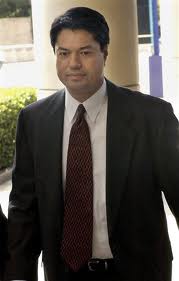 As Congress contemplates an historic extension of governmental control in regard to health care finance, a couple of stories relating to the growth of unrestrained exercise of governmental power in another area grabbed my attention.
As Congress contemplates an historic extension of governmental control in regard to health care finance, a couple of stories relating to the growth of unrestrained exercise of governmental power in another area grabbed my attention.
First, former Dynegy executive Jamie Olis was formally released from federal prison on Friday.
Along with the egregious prosecution of Arthur Andersen, the prosecution and barbaric sentencing of Olis represents a festering wound for anyone who believes in principles of limited government and innocence until proven guilty.
That the judicial system allowed the executive branch to bully Dynegy into serving Olis up as the initial sacrificial lamb of business corruption in the wake of Enron’s collapse is a frightening example of how little protection citizens have from dubious prosecutions. For whatever purpose, Olis remains on probation for another three years.
Meanwhile, reinforcing the point made above, Mary Flood reports that the Department of Justice — apparently with not enough to do in investigating the meltdown on Wall Street over the past year and a half — is actually considering another Enron-related prosecution of the disgraceful Nigerian Barge case, which has already resulted in the unjust imprisonment of four former Merrill Lynch executives for over a year before the Fifth Circuit Court of Appeals threw out their convictions.
As noted in this post from over four years ago (!), the Nigerian Barge prosecution was baseless from the start and, as later developments revealed, trumped-up to boot. That this outrage is allowed to continue is yet another indication that many in the judiciary have ceded their role as an effective check on executive branch excesses.
Finally, the docket of the prosecution of former Enron CEO Jeff Skilling now reflects that the deadline for Skilling’s motion for new trial based on pervasive prosecutorial misconduct has been extended to September 9th.
As noted in this previous post, a reasonable interpretation of the reason for the extensions of the deadline for Skilling’s motion is that the government has turned over massive amounts of exculpatory evidence that the Enron Task Force illegally withheld from Skilling’s defense team during the prosecution of Skilling and the late Ken Lay. Skilling’s Fifth Circuit-ordered re-sentencing that will reduce his inhumane 24-year sentence has been put off indefinitely pending disposition of his motion for a new trial.
The Olis, Nigerian Barge and Skilling prosecutions are the other side of the coin of what happened to Professor Gates.
What protection do we have that the same won’t happen to you and me?
Like this:
Like Loading...
 It was probably inevitable, although I would have guessed an opening Off Broadway rather than in London. But the play is actually getting decent reviews. And it almost has to be better than this trash.
It was probably inevitable, although I would have guessed an opening Off Broadway rather than in London. But the play is actually getting decent reviews. And it almost has to be better than this trash.
 As Congress contemplates an historic extension of governmental control in regard to health care finance, a couple of stories relating to the growth of unrestrained exercise of governmental power in another area grabbed my attention.
As Congress contemplates an historic extension of governmental control in regard to health care finance, a couple of stories relating to the growth of unrestrained exercise of governmental power in another area grabbed my attention.






